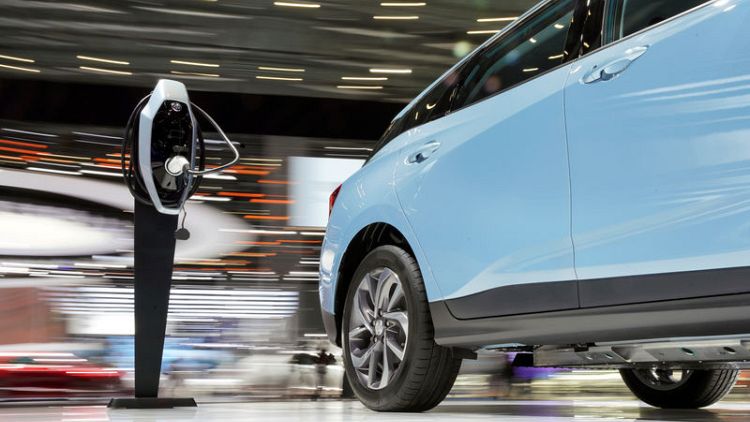GUANGZHOU, China/Shanghai (Reuters) - China's new energy vehicle (NEV) market is likely to see a sales rebound next year as automakers roll out more new products to lure buyers, but more supportive government policies are needed, auto executives said.
China has been a keen supporter of NEVs and has implemented production quota requirements for automakers. However it cut subsidies for NEVs substantialy this year as part of an overall plan to reduce subsidies, making the vehicles costlier. In October, NEV sales fell 45.6% from year-ago levels.
Prior to the subsidy cut, China's market for NEVs - which include plug-in hybrids, battery-only electric vehicles and those powered by hydrogen fuel cells - had been a bright spot, with sales jumping 62% last year.
"For next year, we foresee the NEV market will continue to grow, maybe not as dramatic as it was in the past," Stephan Woellenstein, Volkswagen Group's <VOWG_p.DE> chief in China told Reuters in an interview on the sidelines of the Guangzhou Autoshow last week.
A key part of the revival is linked to more big automakers launching NEV models, he said, as it help NEVs become more mainstream. "This normally makes a difference and will also change consumer perception and drive the market."
Carmakers such as Volkswagen, Toyota's <7203.T> Lexus, Daimler's <DAIGn.DE> Mercedes Benz and Tesla <TSLA.O> came out in force at the Guangzhou Autoshow to showcase newly launched electric vehicles with fresh designs.
Brian Gu, president of Guangzhou-based electric vehicle start-up XPeng which just raised $400 million from Xiaomi <1810.HK> and other investors, said he believed that improvements to the country's charging infrastructure would help NEV sales to recover next year.
Another positive is the falling prices of NEV as more automakers started producing vehicles, he added.
"In about two years time, from my perspectives, electric vehicles will be significantly cheaper than ICEs (internal combustion engine cars), as battery costs come down very rapidly and volumes will drag down cost."
However, not all executives who spoke to Reuters were optimistic. Ma Fanglie, general manager of BAIC Group's electric vehicle unit BAIC BluePark <600733.SS>, said the industry is "feeling a lot of pressure" and that more supportive policies were needed.
Fu Bingfeng, executive vice chairman of China's top auto industry body China Association of Automobile Manufacturers (CAAM) told Reuters government bodies were discussing ways to support the industry in the mid-to-long term.
"Our works now will focus on boosting real consumption-side demands, including improving infrastructures and supply chain."
(Reporting by Yilei Sun and Brenda Goh; Editing by Shri Navaratnam)



